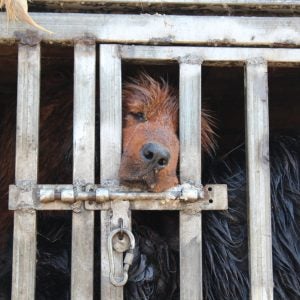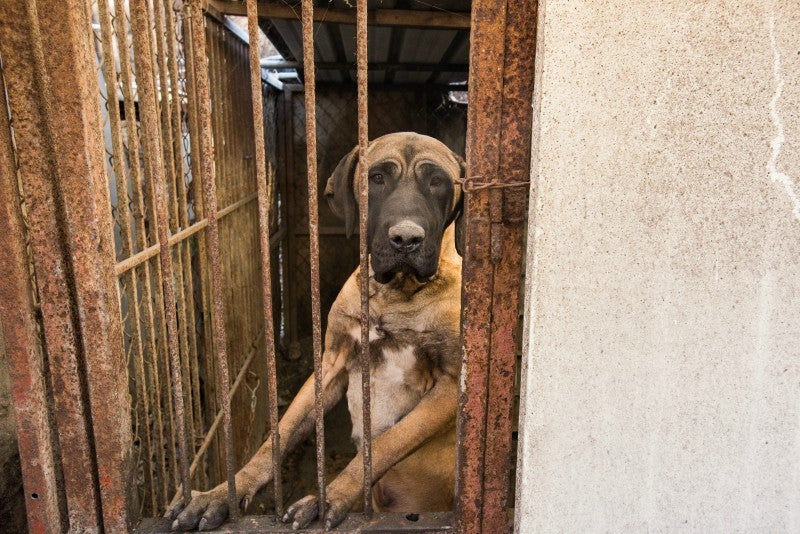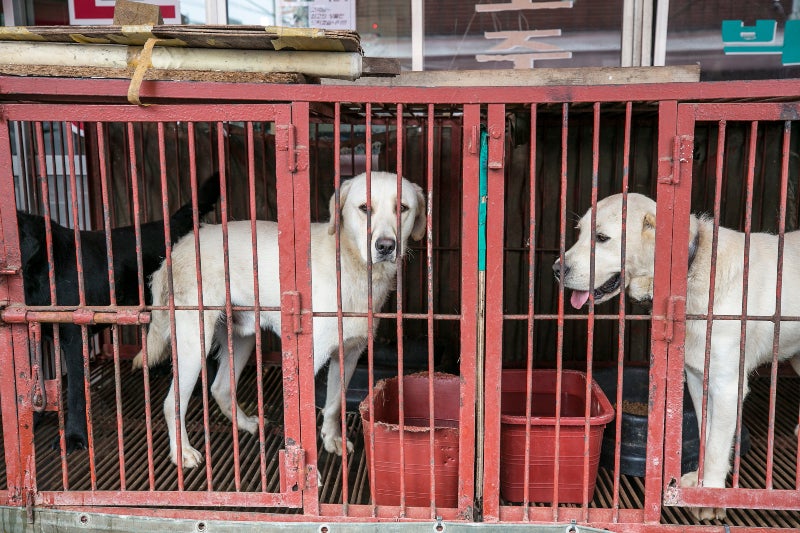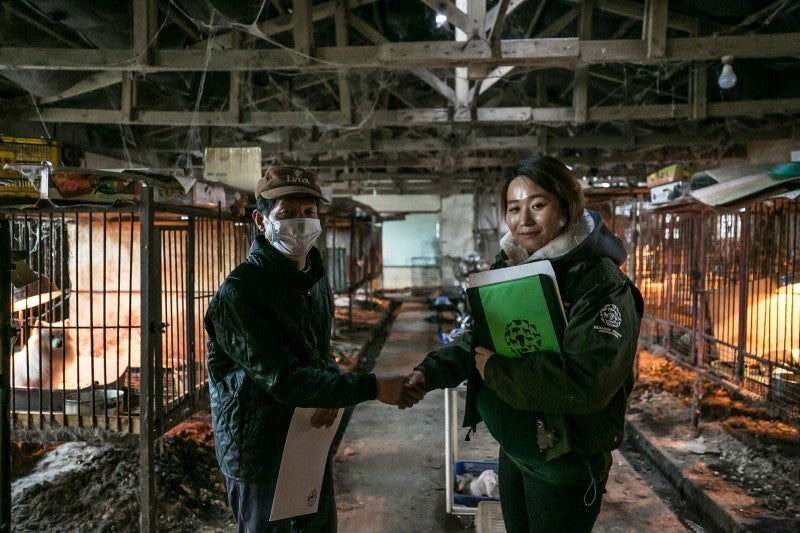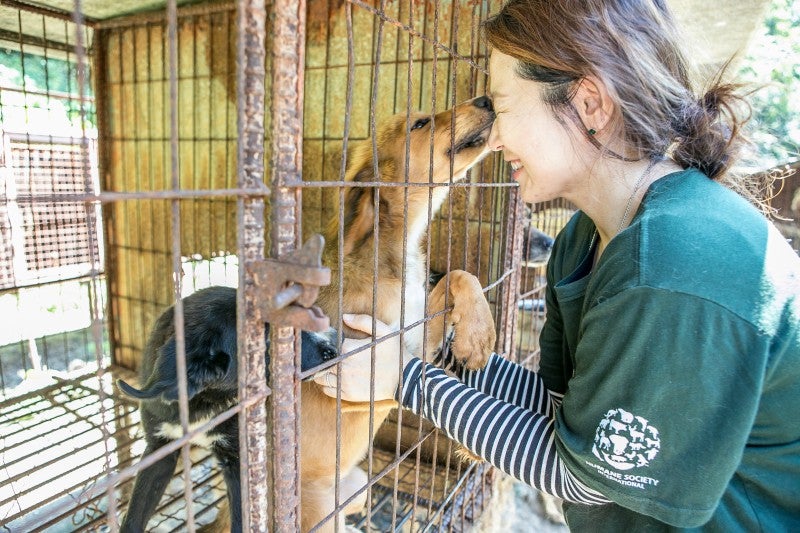Washington D.C. – The latest rescue mission by animal charity Humane Society International is shining a horrifying spotlight on the long-suspected connection between South Korea’s puppy pet trade and the dog meat industry. In a country where dog meat traders go to some lengths to persuade increasingly reluctant consumers that dogs bred for meat are somehow different from their beloved pet dogs at home, HSI’s rescue of nearly 200 Chihuahuas, corgis, huskies, jindos, Yorkshire terriers, poodles, Pomeranians, shih tzus, and French bulldogs from a squalid breeding facility in Hongseong that housed pups under heat lamps in disused tyres, will create shock waves.
Although HSI has found all sizes and breeds of dogs at its previous thirteen dog meat farm closures, this is the first time the charity has discovered a facility where puppies being born for the pet trade were being bred alongside others destined to be electrocuted and butchered for meat to supply local restaurants. Any pups unable to be sold as pets could also end up at the slaughterhouse.
Sixty-year-old Farmer Lee who ran the farm for eight years is eager to leave his dog breeding days behind him. His business is increasingly unprofitable as fewer people in South Korea wish to eat dogs, and selling pups at pet auctions has become competitive; his own family strongly opposes his profession. Mr Lee says he feels ashamed to be a dog farmer, but had no way out until he was introduced to HSI’s dog farm closure scheme by a former farmer with whom HSI had worked. Once HSI closes his farm and removes the dogs for rehoming, Mr Lee hopes to become a security guard with the help of financing provided by HSI for him to take a computer literacy training course.
Farmer Lee said: “From the very beginning, my entire family has been against my dog farming. All my daughters and my wife want me to close it, and they have never wanted to visit the farm. I feel very ashamed to be a dog meat farmer and a puppy mill farmer so I barely tell anyone what I’m doing. My business is also making no money now and it’s too hard to farm the dogs as I have back pain. Also, I’ve had a hard time with my neighbor complaining about the barking which meant I had to move my farm. I spend more money on this farm than I make from it. I think dog meat trade will die soon. I feel like it’s already ending.”
HSI works in partnership with dog farmers to rescue their dogs and transition their businesses to alternative, humane and more profitable enterprises such as crop growing or service trades. Following the closure of this farm, the cages will be demolished and no animals will suffer again on this property. A 20-year contract has been signed by the farmer that ensures he will stay out of the dog meat and any other animal related industry. HSI follows up regularly to ensure compliance among all past farmers. As political and public momentum to end the dog meat trade grows within South Korea, HSI hopes its program will demonstrate a phase-out model that can one day be adopted nationwide with state support.
Nara Kim, HSI/Korea’s dog meat campaigner says: “The lines between puppy mills and dog meat farms are routinely blurred throughout South Korea, and with our latest dog farm closure we are exposing the shocking reality of that. These dogs are suffering at the hands of two abusive industries, their ultimate fate depending on whether they will sell for more money as a pet or for meat. They all start life in this depressing, squalid place, with the lucky few ending up being a loved companion whilst their cage mates are served at a restaurant or enter a chain of auctions where they are sold on to the next farmer to produce litter after litter of puppies. Korean consumers will be shocked to see that the dog meat they buy in restaurants or from markets could come from the very same dogs they see in the pet shop window. No matter where the dogs go, the conditions at this farm are horrifying. The emaciated dogs have matted fur and untreated wounds. We found them cowering in rusty cages as they endure the bitter cold of the Korean winter. It is an immense relief to be able to rescue them and fly them to North America where we can work with partner organizations and begin their search for adoptive families. For them the nightmare is over, and we hope that by exposing their suffering we can hasten the end of the entire industry for good.”
In addition to the nearly 200 dogs, HSI/Korea is also rescuing three pigs who live on Mr Lee’s farm. Named by HSI, Mable, Martha and Maggie are mini-pigs originally bred for the pet trade, but at 50 kg in weight and growing, they were highly unlikely to find happy homes, and faced an uncertain future. As HSI’s legal contract with dog farmers obliges them to transition to strictly animal-friendly livelihoods, the pigs will shortly be starting a new life being cared for at a sanctuary being established with HSI’s partner group KARA.
Dog meat consumption is declining rapidly in South Korea, particularly among younger generations, with a survey by Gallup Korea in June 2018 showing that 70 percent of South Koreans say they will not eat dog meat in future. A series of recent moves by authorities to curb the dog meat trade reflects how Korean society is increasingly ill at ease with the industry. In November last year, HSI/Korea assisted Seongnam City Council in shutting down Taepyeong, the largest dog slaughterhouse in the country, which is to be replaced with a community park.
Facts:
- More than 2.5 million dogs a year are reared on thousands of dog meat farms across South Korea.
- Most people in South Korea don’t regularly eat dog, but it remains popular during the Bok days of summer in July and August, when it is eaten as a soup called bosintang.
- Dogs are mainly killed by electrocution, taking up to five minutes to die. Hanging is also practiced.
- The dog meat industry is in legal limbo in South Korea, neither legal nor illegal. Many provisions of the Animal Protection Act are routinely breached, such as the ban on killing animals in a brutal way including hanging by the neck, and on killing them in public areas or in front of other animals of the same species.
- At each dog meat farm closure, HSI has a veterinarian test for the presence of the H3N2, or dog flu, virus at the time the dogs receive their rabies, DHPP, and corona virus vaccines. HSI also vaccinates the dogs for distemper, parvo and coronavirus. HSI then quarantines the dogs on the farm or at a temporary shelter with no dogs permitted in or out for at least 30 days prior to transport overseas.
Download b-roll video and photos of the rescue here.
ENDS
Media contact:
United Kingdom: Wendy Higgins: whiggins@hsi.org, +44 (0)7989 972 423
South Korea: Nara Kim, nkim@hsi.org


